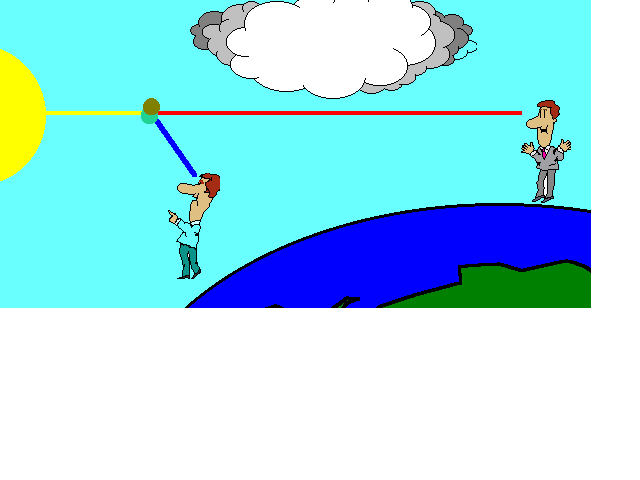The sky is blue....The grass has riz.... Wait on... Why is the sky blue???
Hey - why is the sky blue during the day - but in the morning it's red (if you're up early enough) or in the evening at sunset it's red....
I wonder if there's a creationists point of view of this - so - jp2 is right - scattering.... But... We also need to accept that physics plays no role in the colour of the sky and just that god made it that way.
That's one theory you'd have to teach in Utah - the easy answer in the exam - would get you 100% everytime.
The other answer is:
The type of scattering that makes the sky blue is called Rayleigh Scattering - I'll assume at this point you know a small amount about light and wavelengths (which are in nano metres, light has incredibly small wavelengths!). Blue light has small wavelengths and red light slightly larger wavelengths.
I'd often use a board to show the longer wavelengths of light diffracting or dispersing, while the shorter ones are scattered through the outer atmosphere's gas molecules (lots of nitrogen and stuff like that).
The size of those molecules is also highly important - they seem to fit the blue light between them - it's just 'luck' that god made atoms the way he did, but had we had a different composition of atmosphere we may have had a different colour of sky.
So the sun sends out colours of the entire spectrum that we can see (and plenty more that we can't see such as infra red and ultra violet - the theory is if we could see ultra violet the sky would appear more that colour than blue - however, it is also noted that these even smaller wavelengths are not scattered to the same extent as blue and some are even absorbed - luckily).
So blue, because of its size, fits nicely through the molecules of gas in the atmosphere which causes much grater scattering. While the other end of the spectrum (we see) such as red, has much larger wavelengths and isn't scattered as easily as blue therefore we don't see that at all! Though surprisingly if you look to the horizon as the sun is high in the sky (for those lucky enough to have a blue sky and not a downpour of rain) you'll notice the horizon is more white than blue. Well, it's still blue, but because that light has much further to go to your eyes, some of the scattering is scattered even further and could be scattered away from your eyes - so the sky appears more pale the further to the horizon you look. Not red, because red is still poorly scattered by our gas molecules in the atmosphere.
But... As the sun drifts down towards our horizon, the light that reaches us comes from further away now.
Similar to why the sky is pale at the horizons, more blue light can now be scattered in other directions - as well as the greens. What's left is the better chance for the red light to reach your eyes.
Now dust particles in the air (such as photochemical smog - from trees - or dust, vapours etc etc) may cause more reflection, sending blue light in the opposite direction away from your eyes. Because red light is unlikely to be scattered compared to blue, the blue is now scattered away and the red has more chance to be scattered by the larger particles (which there are far more of due to the larger distance the light has to reach you).
Cast your memory back to that eerie day that.... well, Lake Eyre had lost some of its dust and the sky turned... red... Not just because of the dust being red, but because the sunlight now became absorbed and scattered for the much larger wavelengths - even at midday!
Here's a picture for you:
There's also some reasonable explanation at that site where the photo comes from too...
I bet Bluetongue1 could come up with a better explanation than mine... And so could JPN (though, I did suggest that god made the sky blue, which should be close enough to that explanation).
So - in summary - shorter wavelengths are scattered... The further they have to go the more scattered they become. The more scattered they become the less incident on your eyes so you see less blue. Red at sunset has more distance to go and now more chance for the scattered red light to hit your eyes. As the red light is less likely to be scattered it won't be scattered away like the blues and the greens. The dustier and more polluted (whether it be natural or not) will cause more red light to scatter in our direction too.




